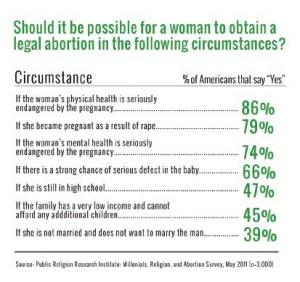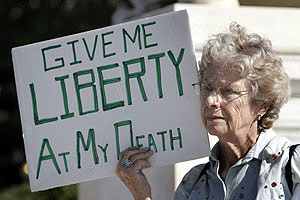Introduction
There are complicated moral and ethical questions involved in womenÔÇÖs health issues and access to health care for theists and nontheists alike. However, the particular influence of sectarian religious belief on government policy regarding women suggests a government endorsement of particular religious beliefs to the exclusion of minority and non-theist views.
ABORTION BANS
 In the landmark case Roe v. Wade, the U.S. Supreme Court recognized that the U.S. Constitution protects a womanÔÇÖs right to make her own medical decisions, including her decision to have an abortion. Therefore, a state may not ban abortion prior to viability. In the 40 years following that landmark ruling, in decisions including Casey v. Planned Parenthood of Southeastern Pennsylvania, the Supreme Court has never wavered from this principle.
In the landmark case Roe v. Wade, the U.S. Supreme Court recognized that the U.S. Constitution protects a womanÔÇÖs right to make her own medical decisions, including her decision to have an abortion. Therefore, a state may not ban abortion prior to viability. In the 40 years following that landmark ruling, in decisions including Casey v. Planned Parenthood of Southeastern Pennsylvania, the Supreme Court has never wavered from this principle.
Yet the nationÔÇÖs most extreme bans on abortion were passed by various state legislatures in 2013. The Arkansas legislature overrode Governor Mike BeebeÔÇÖs veto of a bill banning abortion at 12 weeks, and North Dakota banned abortion at 6 weeks. Abortion bans are not only bad policy because they prevent a woman from making her own personal, private decision about her health and medical care, but because they violate womenÔÇÖs constitutional rights.
NON-SURGICAL ABORTION
Women in the United States have been safely and legally using non-surgical abortion for years, but anti-womenÔÇÖs health activists have devoted significant attention to creating barriers and restrictions to block access.
Bills restricting non-surgical abortion are being considered in states ranging from North Carolina to Arkansas to Missouri and Mississippi. In states where these restrictions have been passed, some women have been forced to have a surgical procedure when they would have chosen non-surgical abortion instead.
Non-surgical abortion gives a woman the option of a more private, less invasive method of ending a pregnancy, in a setting in which she feels more comfortable. With a medical professional, she decides when the abortion starts, where it should happen, and who should be with her while it is happening. She has access to medical professionals 24 hours a day, seven days a week if she has any questions or concerns. One in four women uses this method, and if a woman follows the instructions provided, there are no risks to her future fertility.
POLICY RECOMMENDATION:┬áLaws and regulations of womenÔÇÖs healthcare must be based on scientifically sound medical research and driven by a compelling government interest, not sectarian religious beliefs.
BIASED COUNSELING
 A woman should have accurate information about all her pregnancy options. Information should support a woman, help her make a decision for herself, and enable her to take care of her health and well-being. It should not be provided with the intent of shaming or coercing her toward any particular decision.
A woman should have accurate information about all her pregnancy options. Information should support a woman, help her make a decision for herself, and enable her to take care of her health and well-being. It should not be provided with the intent of shaming or coercing her toward any particular decision.
Recent bills propose mandatory waiting periods, mandatory ultrasounds, and could force doctors to provide state-mandated, ideological scripts to their patients. A recent evaluation of TexasÔÇÖ 2011 biased counseling law found the law does not enhance health information, but rather places unnecessary hurdles before a woman can make a private medical decision. The law has the compound effect of making a woman feel ashamed and adds additional costs to a safe and legal procedure.
POLICY RECOMMENDATION: Access to scientifically accurate, unbiased, timely information about reproductive health and pregnancy options should not be obstructed by religiously motivated legislation or regulations.
HEALTH CARE PROVIDER REFUSAL LAWS
 Following the U.S. Supreme CourtÔÇÖs 1973 decision in Roe v. Wade, several states and the federal government enacted health care provider refusal laws (ÔÇ£Refusal LawsÔÇØ). These laws allowed medical professionals to decline participation in abortion-related services. Congress passed the Church Amendment, which permitted any health care facility or provider receiving federal funds to refuse to provide abortion services and sterilization services if doing so violated the providerÔÇÖs religious or moral beliefs. The District of Columbia and 46 states have statutes allowing medical professionals to refuse to provide abortion services.
Following the U.S. Supreme CourtÔÇÖs 1973 decision in Roe v. Wade, several states and the federal government enacted health care provider refusal laws (ÔÇ£Refusal LawsÔÇØ). These laws allowed medical professionals to decline participation in abortion-related services. Congress passed the Church Amendment, which permitted any health care facility or provider receiving federal funds to refuse to provide abortion services and sterilization services if doing so violated the providerÔÇÖs religious or moral beliefs. The District of Columbia and 46 states have statutes allowing medical professionals to refuse to provide abortion services.
Religious refusal exemptions, also known as ÔÇ£conscience clausesÔÇØ allowing health care providers to decline to provide lawful services that conflict with their religious or moral beliefs, must balance the providerÔÇÖs conscience claims with the patientÔÇÖs right to care, privacy, and self-determination.
Conscience clauses should apply only to individual providers and not their places of employment: all secular health care institutions and business entities serving the public should guarantee the presence of medical professionals willing and able to provide all lawful health care services requested or required by patients. If an organization chooses to establish itself as a secular business, operating in the secular marketplace, it should abide by secular law.
More recently, Refusal Laws have expanded into the area of prescriptions and to pharmacists themselves. At least 12 states have laws allowing a pharmacist to refuse to fill lawful prescriptions for drugs that the individual considers ÔÇ£abortifacientÔÇØ, including emergency contraception prescriptions.However, when some states tried to impose an affirmative duty on pharmacists to dispense emergency contraception, federal courts held that these mandates violated the pharmacistsÔÇÖ rights under the Free Exercise Clause of the First Amendment and the Equal Protection Clause of the Fourteenth Amendment.
Refusal Laws can be challenged on the basis of their conflict with the right to privacy of the individual.35 A female is denied the right to decide whether to use contraception when a pharmacist denies her right to have it. These laws also raise issues of Equal Protection. When the law allows pharmacists to refuse to fill contraceptive prescriptions, it sanctions unequal treatment of men and women. More practically, issues of access are raised, especially for women in low-income or rural areas, for whom a refusal to dispense may cut off access to contraceptives entirely.
POLICY RECOMMENDATION: Patients should not be denied medical care through laws that allow medical professionals to deny patients abortion and sterilization procedures (or other services), and enable pharmacists to refuse to fulfill lawful prescriptions for contraception including emergency contraception.
RELIGIOUS EXEMPTION FOR CONTRACEPTIVE CARE
 The contraceptive coverage requirement of the Affordable Care Act is intended to serve the compelling public health and gender equity goals and is in no way targeted at religion or religious practices, keeping in line with First Amendment jurisprudence. However, the Department of Health and Human Services announced a broad religious employer exemption to include all non-profit organizations that claim a tax exemption as a ÔÇ£religious employer.ÔÇØ This criterion is ripe for abuse because any organization can claim it, without any requirement of proof.
The contraceptive coverage requirement of the Affordable Care Act is intended to serve the compelling public health and gender equity goals and is in no way targeted at religion or religious practices, keeping in line with First Amendment jurisprudence. However, the Department of Health and Human Services announced a broad religious employer exemption to include all non-profit organizations that claim a tax exemption as a ÔÇ£religious employer.ÔÇØ This criterion is ripe for abuse because any organization can claim it, without any requirement of proof.
This exemption sets the precedent that the religious interests of a few employers come ahead of immense health and social benefits of all Americans. Specifically, the exemption will have a significant impact on American women across a wide spectrum of the workforce. Millions of American women are employed by non-profit organizations, particularly with non-profits that are commonly religiously affiliated such as schools or hospitals.
These women are entitled to earn a living without sacrificing their health and their own religious liberty. Although the current exemption is vague and overly broad, cases are working their way through the courts from for-profit employers claiming the religion of the boss dictates the health care choices of the employees. Claimed religious objections to federal law by founders of for-profit businesses do not entitle those businesses to violate laws that protect their employees.
POLICY RECOMMENDATION: Religious exemptions from a neutral law of general applicability such as the contraceptive coverage in healthcare plans should be limited only to houses of worship in regards to employees with ministerial duties.




